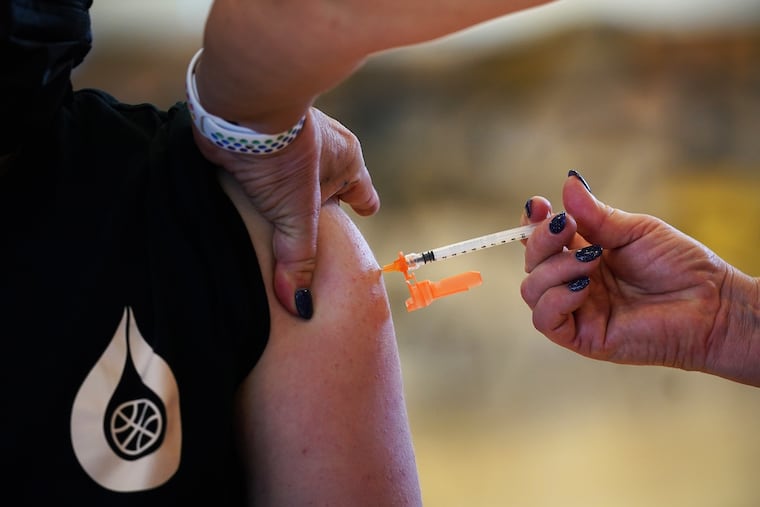How one Philly nursing home overcame hesitancy to get 98% of staff vaccinated | Opinion
Lessons for employers who might be struggling to get employees to commit to a COVID-19 vaccine.

With the introduction of COVID-19 vaccines, Germantown Home was determined not to relive the horrors of 2020. This 180-bed Pennsylvania long-term care facility owned by Philadelphia nonprofit NewCourtland had learned from experience how easily this virus can enter and spread within a vulnerable population. Employee-transmitted COVID-19 was considered to be a preventable problem deserving maximal effort to avoid morbidity and mortality.
U.S. vaccine hesitancy was well publicized in advance of the federal COVID-19 vaccine program. Staff surveys at Germantown Home confirmed this hesitancy. To proactively address staff concerns, Germantown Home administrative and medical personnel began an employee COVID-19 vaccine education campaign in early December 2020.
Our hope in writing this is that our experience can help other organizations increase their vaccination rates.
Over the next two months, the campaign used a multifaceted approach, including regular updates at staff meetings, posting of informational flyers, distribution of weekly “frequently asked questions” sheets, small group meetings, and countless one-on-one discussions. Several live webinars were conducted, featuring a panel of a research pharmacist, a physician, an administrator, and front-line employee representatives.
» READ MORE: I was a COVID-19 vaccine skeptic. Now I want you to get your shot. | Opinion
Staff members were able to ask questions of the panel anonymously. Using straightforward and nonjudgmental communications, every conceivable effort was made to allay fears and dispel misinformation about the vaccine.
Unfortunately, as Germantown Home prepared for its third and final federal vaccine clinic in early February, vaccine uptake remained suboptimal. Only 50% of employees had consented to receive the vaccine. Management recognized the need for a new approach to improve vaccine uptake.
Since the facility had a long-established influenza vaccine mandate, management decided to apply this precedent to the COVID-19 vaccine, making it a requirement for continued employment, with clearly defined religious and medical exemptions. The COVID-19 Vaccine Condition of Employment policy was announced on February 9, allowing until May 1 for employees to become vaccinated.
Administrative and medical personnel doubled down on efforts to address employee concerns and questions about the vaccine, especially focusing on individualized discussions. The facility arranged additional on-site vaccine clinics every three weeks to provide convenient vaccination opportunities, with medical personnel on hand for reassurance about safety and side effects.
By the May 1 deadline, 89.9% of the 246 staff members were fully vaccinated, and subsequently 98.6% completed the vaccination series. Seven had approved religious or allergy exemptions. A total of 18 employees resigned. No legal actions occurred. All new hires from this point forward are required to comply with the COVID-19 Condition of Employment policy.
» READ MORE: The COVID-19 vaccines are free. What should you do if you get a bill?
Germantown Home has remained free of facility-acquired COVID-19 cases during 2021. Concurrent with employee vaccinations, resident vaccine uptake has been over 90%. As a result of the successful vaccine program, Germantown Home employees, residents, and resident families have experienced greater peace of mind. Activities, including family visitation, are gradually becoming more “normal.”
While the COVID-19 Vaccine Condition of Employment policy was declared a success at Germantown Home, we recognize that this is not the end of the story. The pandemic persists, with variants creating new challenges and uncertainties.
Vaccine efficacy is not 100%, and the duration of immunity following immunization is still unknown. As of this writing, the need for booster doses remains under study. That said, the vaccine has been shown to decrease the transmission of COVID-19 and the severity of illness. These benefits are invaluable in the care of a high-risk population. For now, we have a welcome reprieve from COVID-19.
We understand that mandatory COVID-19 vaccination may not be practical for every post-acute and long-term care facility at this time. Certainly, there are associated risks, including employee objections and high turnover.
Germantown Home had anticipated these risks when implementing the vaccine mandate and took steps to minimize them. Fortunately, these efforts paid off. We believe that the following approaches facilitated high employee acceptance of the mandatory vaccination policy:
Plenty of lead time to allow for a gradual decision process
Multiple convenient on-site vaccine clinics
Frequent and recurring vaccine education and reassurance
Involvement of diverse personnel and front-line vaccine champions in the education process
Respectful one-on-one interactions with vaccine-hesitant individuals
Despite ever-mounting and overwhelming evidence for COVID-19 vaccine safety and efficacy, acceptance by U.S. post-acute and long-term care employees has lagged. Given the worldwide persistence of this devastating pandemic, employment mandates in healthcare and other high-risk settings will continue to increase.
Our experience at Germantown Home illustrates the potential for success of a COVID-19 Vaccine Condition of Employment policy in a post-acute and long-term care facility when combined with a tailored implementation process.
Drs. Mary Schuler and Ashley Ritter work for NewCourtland in Philadelphia. Dr. Ritter is a board certified Adult Gerontologic Primary Care Nurse Practitioner, and she conducts research focused on improving care delivery systems for seniors with complex medical and social needs.